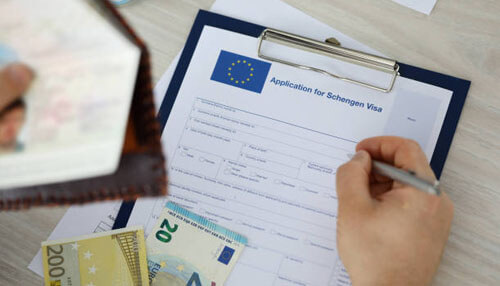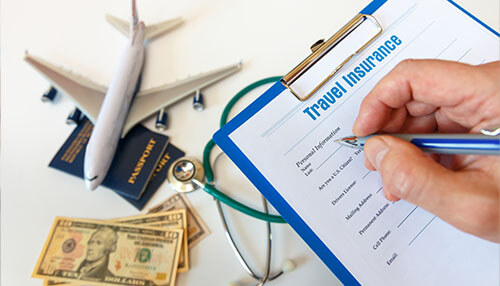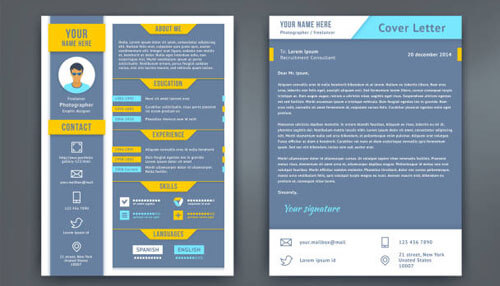To submit a Schengen visa application, you must additionally present documentation evidencing that you meet the eligibility requirements laid out by the countries’ authorities.
The documents requested will depend on the type of visa you aim to apply for. In some cases, the immigration bureau of a Schengen area country may summon you for an interview or ask for additional documentation, without which they may decline your petition.
In this short guide, we’ll be elaborating on each of the documents you’ll be asked to produce throughout the process.
Schengen Visa Documentation
The common documents demanded for a Schengen visa application are:
Valid passport
The passport should contain at least two empty pages for the visa stamps. It should also:
- Not be older than 10 years.
- Have a validity period that covers the duration of the stay and exceeds – for at least three additional months – the stipulated departure date.
Schengen Visa application form
The application form contains several fields, including full name, date/country of birth, nationality, and place of residence. You would also have to inform about your sex, marital status, passport details (issuance and expiration dates, number, etc.), the purpose of your trip, duration of stay, and the visa type you’re requesting.
Photograph
You must accompany your form with two identical pictures of yourself, and one of them should be pasted onto the form itself. The photographs should also comply with the Schengen standards, to wit:
- They must have been taken within the 6 months prior to filing the application.
- Dimensions: 35x40mm.
- The face should take up 70-80% of the frame.
- The background must be plain and light-colored.
- The face should reflect a neutral expression (no grimace or grin).
- The eyes should look directly at the camera and remain open, with no hair, red eye, shadows, colored lenses, or sunglasses covering them.
- No large accessories or digital makeup covering the face are allowed.
- You should not wear a cap, hat, or any other type of headwear unless used for religious purposes.
- The photo should have the appropriate brightness with no filters, ink marks, creases, unnatural skin tones, flash reflections, or blur effects.
Payment proof
This is the receipt issued as you paid your fees, which you have to show at the moment of collecting your processed application. These fees will not be refunded.
Travel medical insurance covering your stay
Schengen area countries demand a minimum travel medical insurance coverage equaling 30,000€ per person and valid during the entire stay. The insurance should cover costs related to doctor visits, emergency dental care, surgery, hospitalization, in-patient or out-patient treatment, or repatriation for health reasons/death.
Most mainstream insurance companies offer plans specifically designed for Schengen visa applicants. Moreover, when you purchase a travel medical insurance plan, your provider will issue a “travel insurance certificate”, which can be then presented to the immigration officer.
Biometric data
You’ll have to register your fingerprint, which will be stored in a database called the Visa Information System (VIS). All applicants must comply with this request, except for the following categories:
- Children under 12 years of age.
- People with physical impossibility to produce fingerprints.
- Government officials and Heads of State, their spouses, and delegation members in the context of an official visit.
Previous visas
If you have legally traveled to the Schengen territory before with a currently full or expired passport, you ought to submit a copy of said passport along with other documents that can serve as proof of your travels. You would have to bring all the passports you have traveled with, stacked together with a rubber band.
Proof of financial status
To prove that you’re capable of sustaining yourself during your stay in the Schengen country or countries, you could submit bank statements containing your balance and movements made during the past three months. The statement must have been issued during the last three days.
The amount required is wholly dependent on the country’s specifications. Therefore, you’d have to seek information from the relevant consular office.
Proof of accommodation
Proof of accommodation can be either a hotel booking or an invitation letter signed by family members or friends stating that they’re able to receive you into their home for the duration of your stay.
The production of extra documents could be ordered if you intend to travel to certain countries. These are some examples:
- Austria: The host must ask for an electronic commitment declaration at the respective municipality and deliver it to the Austrian authorities no earlier than 30 days prior to the applicant’s arranged visa appointment date.
- Belgium: The host would need to have a commitment to support stamped by the foreign office.
- France/Luxembourg: The host would need to submit a guarantee document or “Declaration d’Accueil”
Cover letter
The cover letter should contain your introduction, travel plan, and information on what you’ll do and where you’ll stay. The letter must be addressed to the Embassy or Consulate of the country you will visit.
Additional documents
The demand for additional documents will depend on your working status. These could be:
- Student status proof: You need to show evidence that you’re a student via any official means, such as a student card or matriculation document, along with a signed student index and the current transcript of records. You would also need to show your capability of sustaining yourself, either with a work contract or bank statements from parents or hosts.
- Employment or self-employment proof: If employed, you must provide a letter from the employer, a recent paycheck, the contract, a vacation confirmation, and a bank statement showing you have the means to support yourself. If you’re self-employed, a letter signed by the accountant or solicitor should be enough to prove your self-employment status.
- Retirement proof: You could submit pension statements issued during the past 6 months.
For children under 18, these are the additional requirements:
- Two signatures from the parent/s or the legal guardian/s.
- A full-length birth certificate
- Certified parental consent produced by both living parents if the child plans to travel alone. If traveling with only one parent, a certified consent by the other parent, unless the accompanying parent has the sole paternal authority, in which case a court order, death certificate, or custody agreement must be presented.
Contact an Immigration Lawyer for Schengen Visa Help
If you want useful Schengen visa advice or a fast track Schengen visa, get in contact with one of our qualified immigration lawyers at Total Law. We’re capable of offering timely legal assistance to people wishing to travel to the Schengen area so that their applications go smoothly and without any drawbacks.




